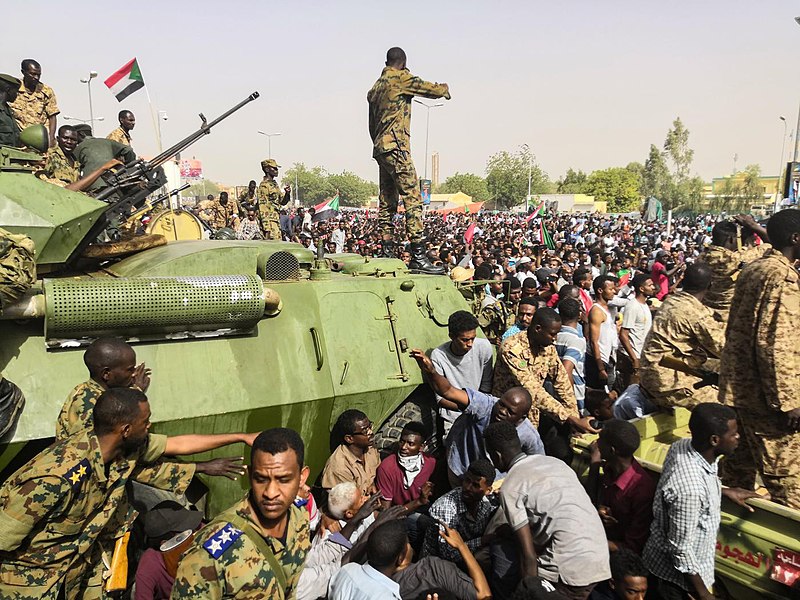Opinion | Solve Sudanese suffering with patience
Photo courtesy of Wikimedia Commons
Sudanese soldiers stand guard around military vehicles as demonstrators continue their protest against the regime on April 11, 2019. Columnist Milly Zafar believes that any US or international interference in Sudan will worsen the situation.
December 2, 2021
Hamsa Hassan, a Sudanese protester, declares, “The people are mobilizing by themselves because there is no internet, no phone connection; no one is leading us.” Swathes of citizens like Ms. Hassan are suffering these consequences due to a military coup that was completely preventable.
On Oct. 19, General Abdel Fattah al-Burhan carried out a military coup against Sudanese President Abdallah Hamdok. Before the coup, there was a shared leadership structure led by Hamdok and al-Burhan.
Before 2019, dictator Omar al-Bashir controlled Sudan for 30 years before a separate military coup removed him from power. After the 2019 coup, the Sudanese protested against the new military government, which resulted in the establishment of the Sovereignty Council of Sudan by the federal government.
This Council is the primary government structure that presides over Sudan, consisting of military and civilian leadership comprised of 11 members. The military and civilian leadership officials signed a constitutional agreement that states that over the subsequent 30 months, the first 21 will be ruled solely under military leadership by al-Burhan. After 21 months, the civilian leadership headed by Hamdok is supposed to be transferred the power to set up free elections per the agreement.
However, this planned shift toward democracy is not looking promising.
Get The Daily Illini in your inbox!
The reason for this unlikelihood is due primarily to al-Burhan being allowed to remain in power for 21 months — this period saw him accrue support from military officials who want the current government to remain in power. As a result, al-Burhan had the backing to stage the coup that is currently ravaging the Sudanese population for him and his military government to retain their leadership.
Al-Burhan is a voracious military leader who shouldn’t have been in power in the first place, let alone 21 months — he should have been removed after the 2019 coup. He seized power from al-Bashir, an act which alone portended the possibility that he might stage another coup to remain in power.
The General promises to maintain the existing promise to hold free elections in 2023, but they will undoubtedly fail to take place because al-Burhan’s unpopularity would see the citizens remove him from office — something he is well aware of and will not allow to occur.
Many things could have been done to prevent al-Burhan’s second coup, but the past can’t be changed. So, where does Sudan go from here?
The people of Sudan are rightfully protesting for the democratic election they deserve — this is one step in the right direction. There is an outcry for democracy, but protests alone will not be sufficient. Fortunately, there exists an effective supplement to the protests that could help solve this crisis: using the current state of the Sudanese economy as leverage.
Sudan is in severe debt. Inflation in Sudan is up by 400%, and the national debt will hit $1.25 trillion by 2025. The initial plan was for Sudan to receive substantial foreign aid from several other countries on the condition that al-Burhan peacefully transfers power to Hamdok — for obvious reasons, this did not occur.
Al-Burhan is well aware of Sudan’s debt, and if foreign nations continue to withhold aid, he will be much more likely to abide by their demands and step down from leadership. Sudan is suffering economically and most likely will not be able to function for much longer due to instability and lack of government funding — problems which can most effectively be alleviated by the reception of foreign aid, which al-Burhan knows won’t occur unless he steps down.
Despite all the complexities presented by the situation in Sudan, one thing is clear: Military intervention is not the answer. In the past, the U.S. has been notorious for becoming involved in various foreign political crises across the world. Recently, President Biden pulled troops out of Afghanistan — who should not have been there in the first place — which led to a disastrous conclusion in which the Taliban took over Kabul and the majority of Afghanistan.
The situation in Afghanistan is just one example of why it is paramount that al-Burhan is handled without military interference and for patience to prevail. Adding the U.S. military to the situation in Sudan would only inflame the conflict and devastate the people of Sudan, who would assuredly be caught in the crossfire. The international community must persist and withhold all aid from Sudan until al-Burhan releases the Sudanese people from his rule.
Milly is a freshman in LAS.







